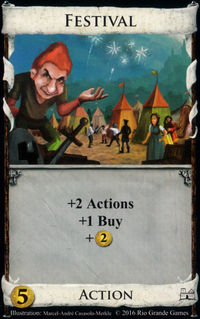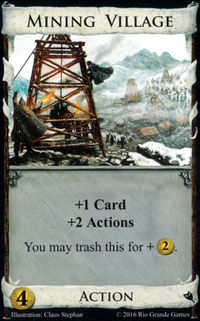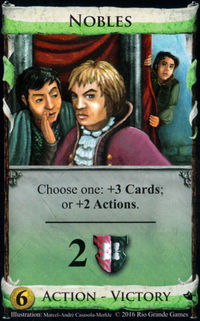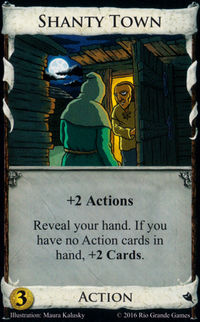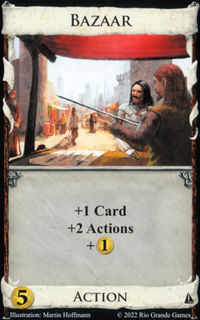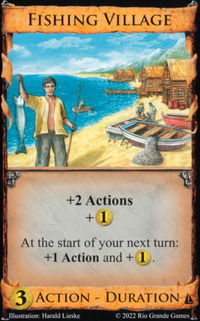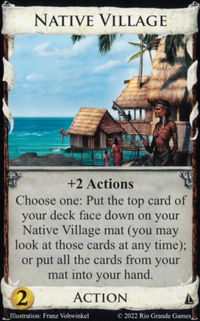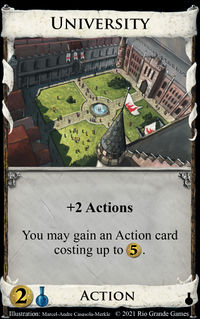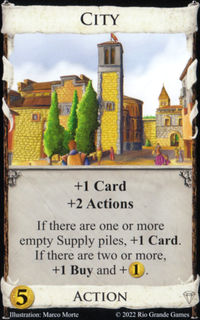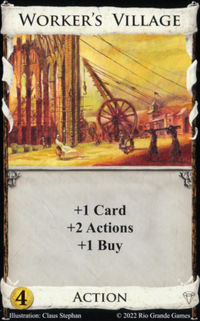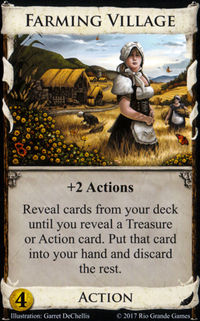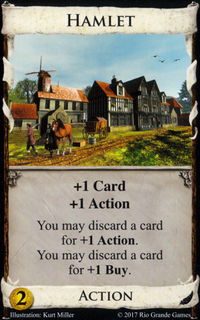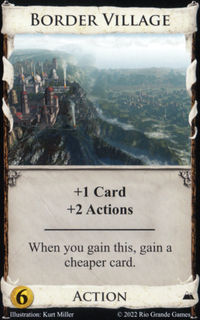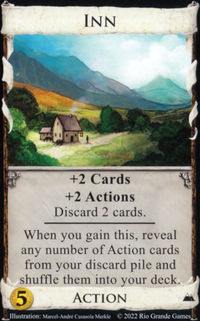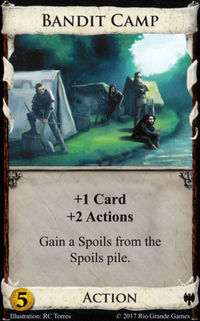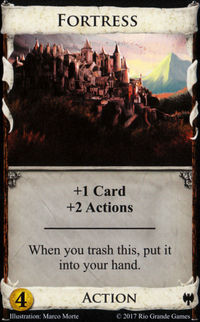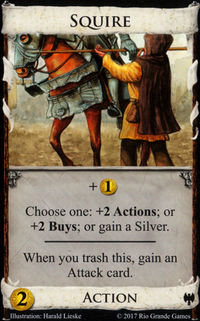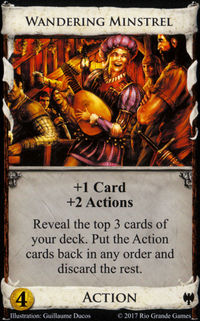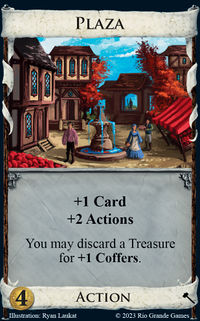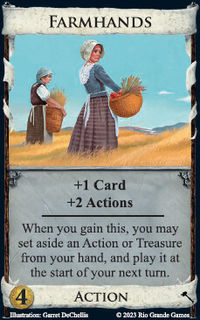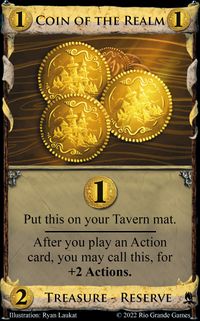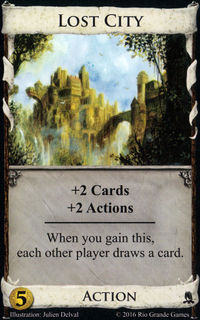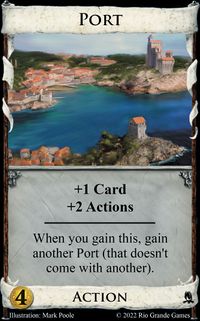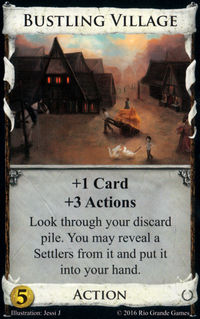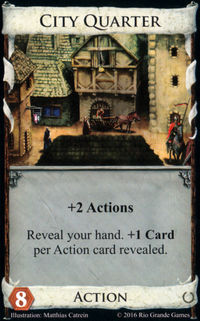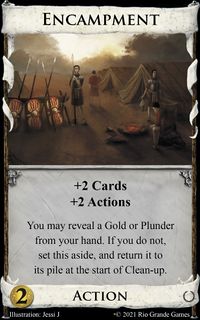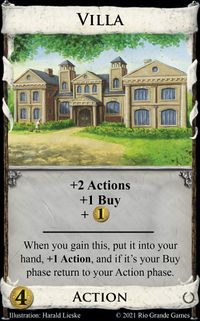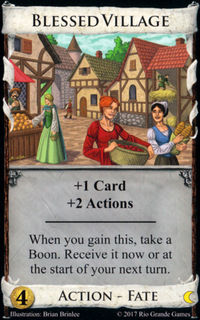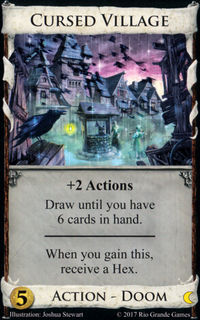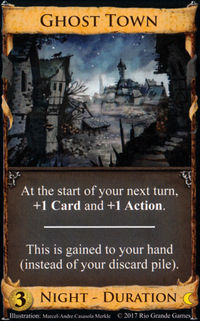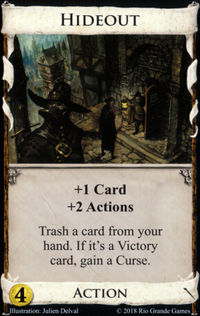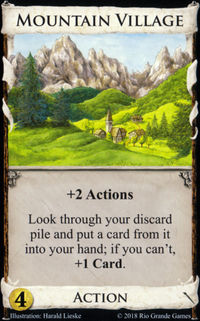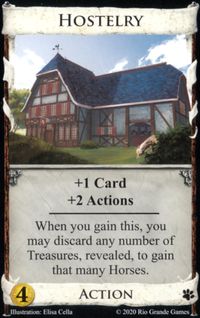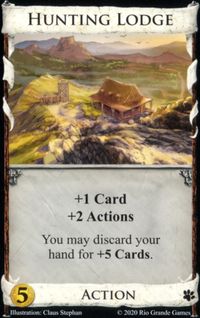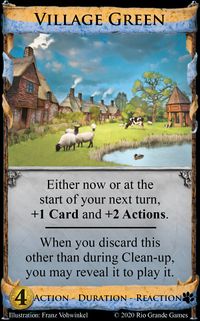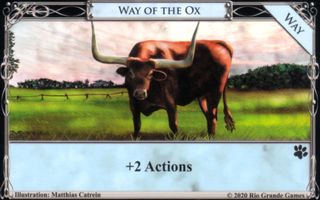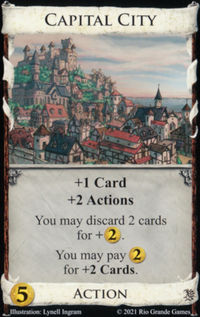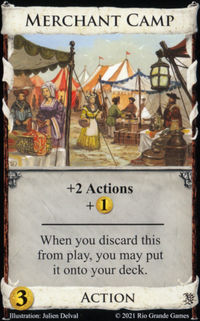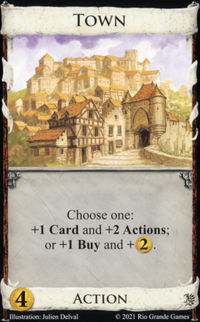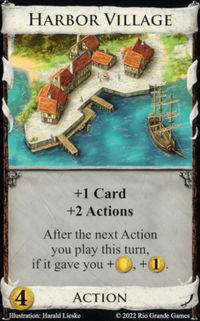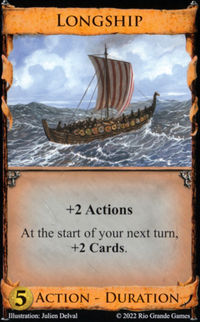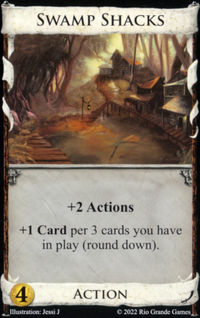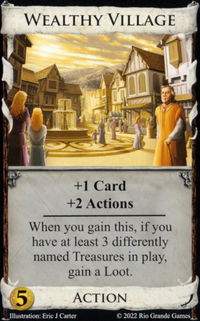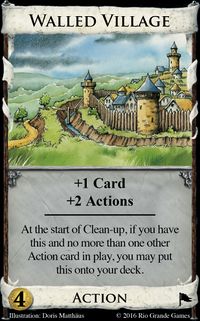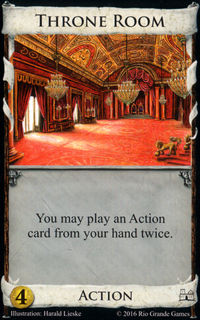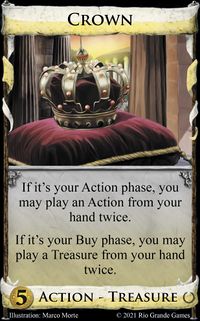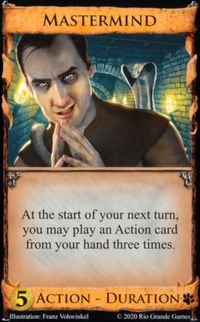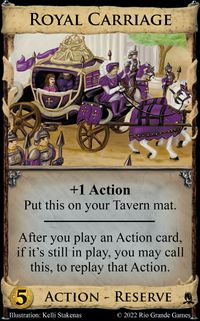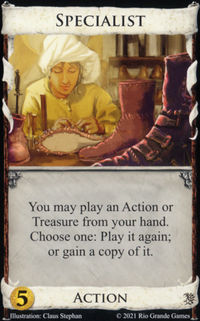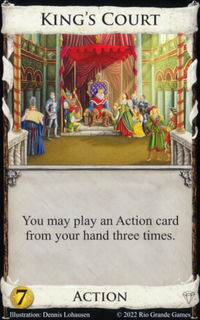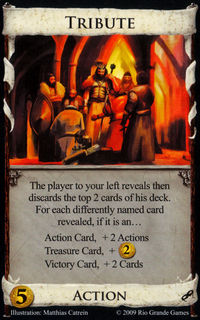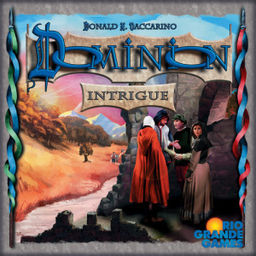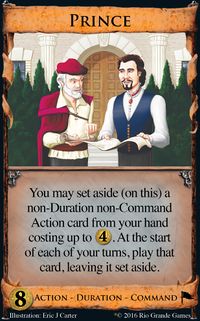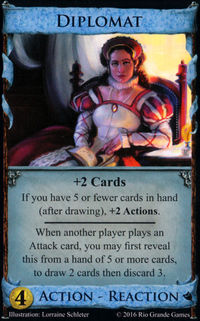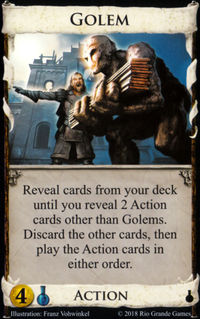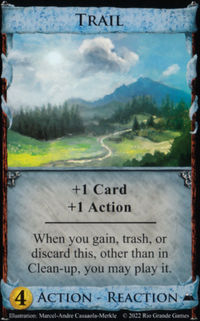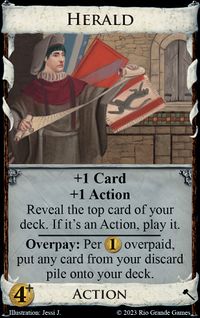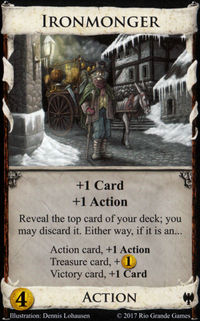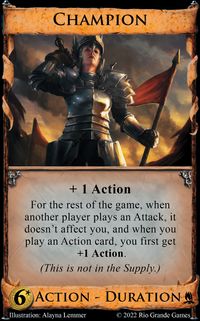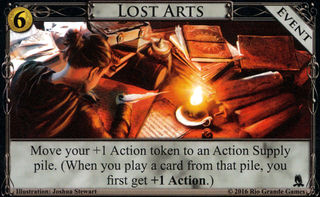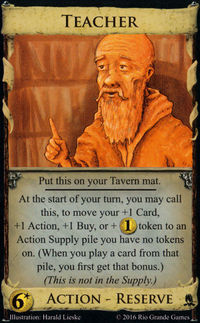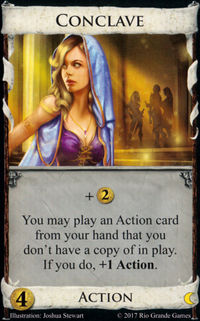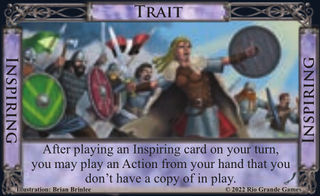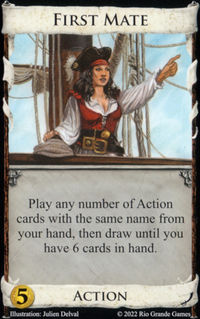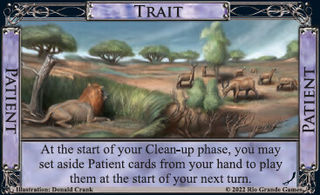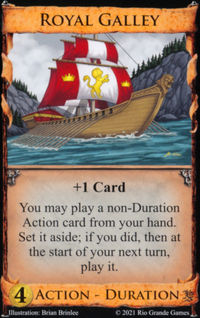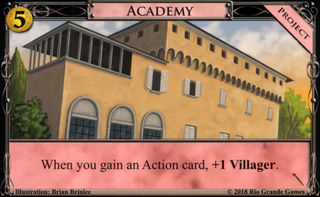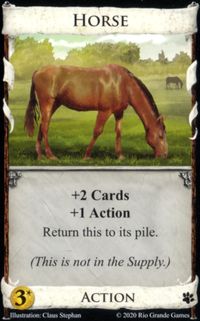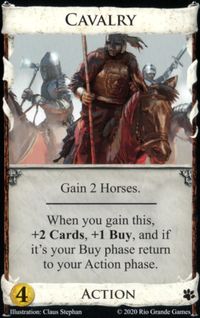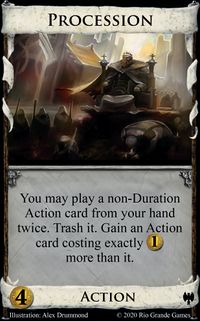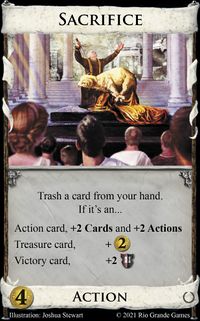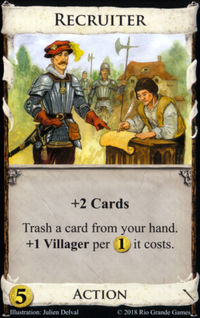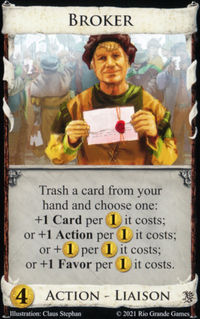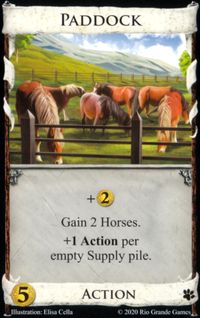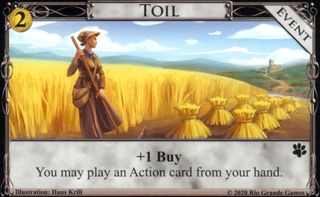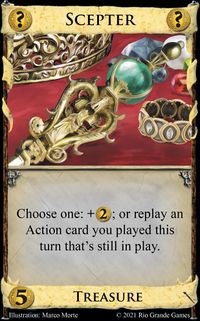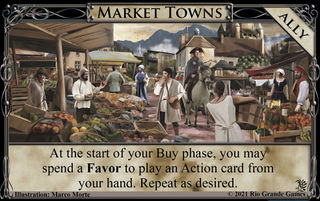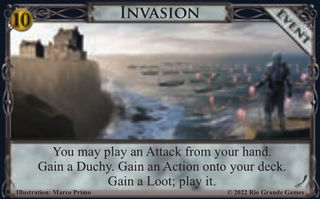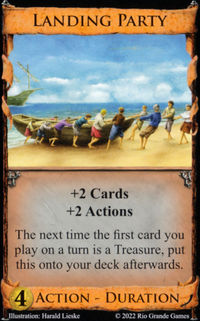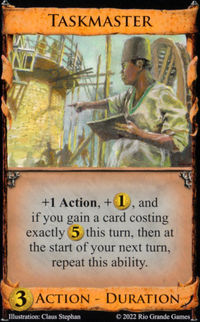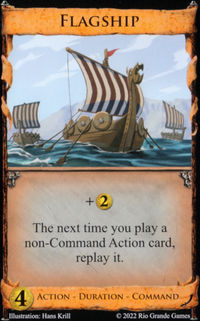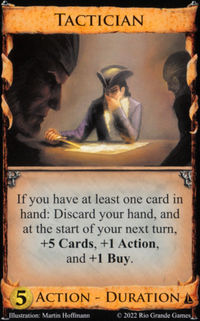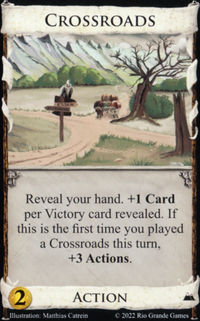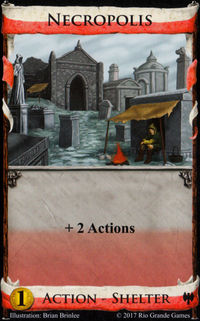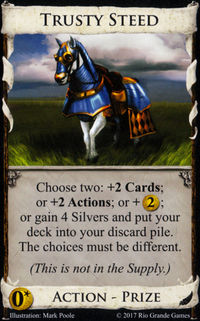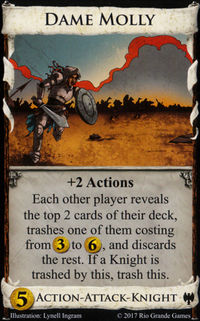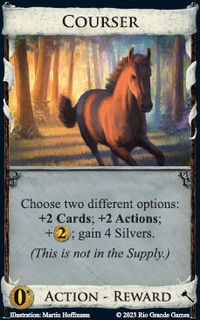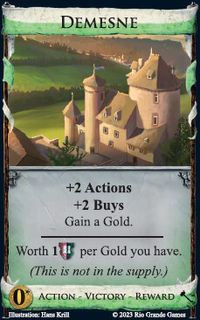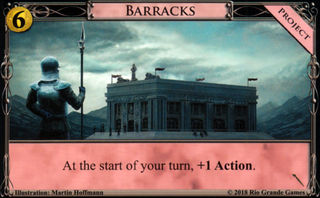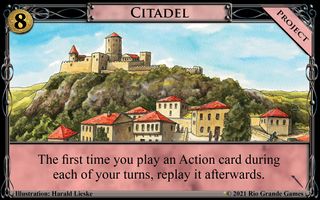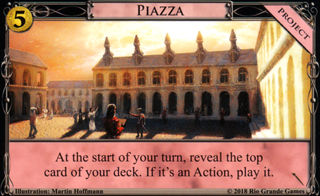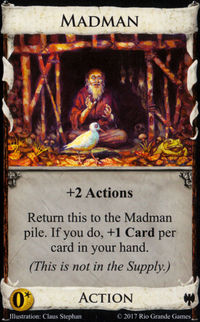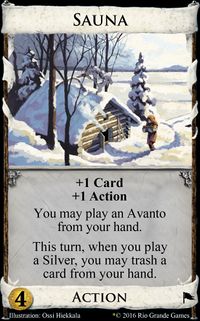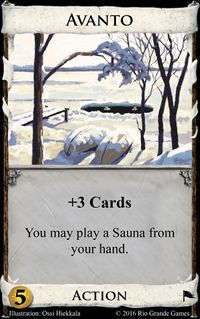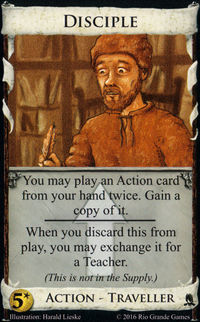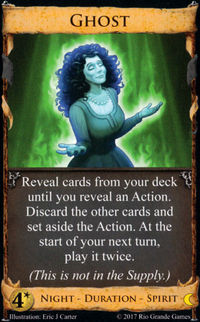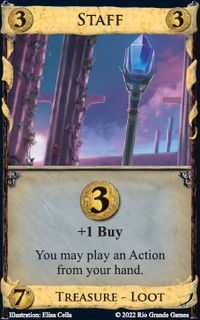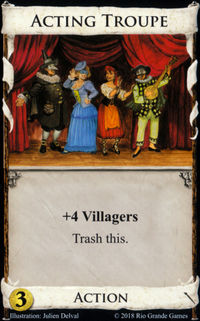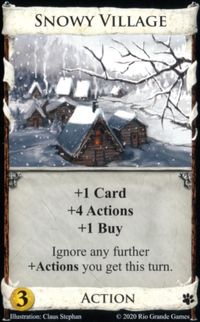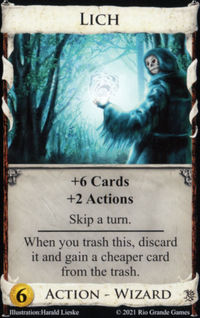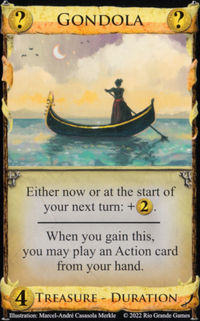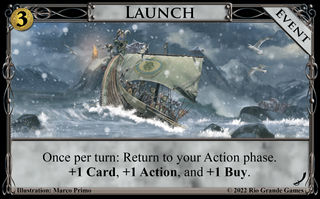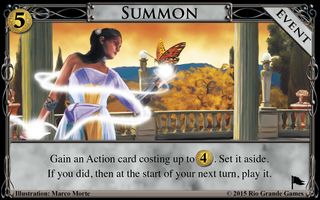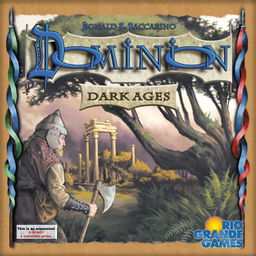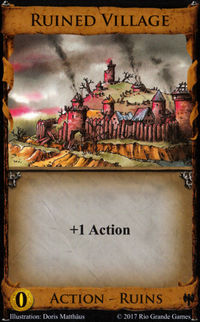Village (card category)
m (Move to subcategory Category:Terminality) |
(→Villages offering limited terminal space) |
||
| (100 intermediate revisions by 17 users not shown) | |||
| Line 1: | Line 1: | ||
[[Image:Village.jpg|thumb|right|200px|[[Village]], the archetype for this category.]] | [[Image:Village.jpg|thumb|right|200px|[[Village]], the archetype for this category.]] | ||
| − | '''Village''' is the informal generic name for the family of | + | '''Village''' is the informal generic name for the family of cards which offer the ability to play more than one [[terminal]] Action in a turn—so called because many of them have "village" in their names. The simplest village card is {{Card|Village}} itself. Typically, these cards offer +2 Actions, but there are some village cards which give this effect in other ways. |
| − | + | The presence of villages in a given [[Kingdom]] is important because having a cap on the number of terminal actions that can be played in a turn is a significant limiting factor in the potential of decks that can be built; Kingdoms with villages and Kingdoms without villages play very differently. Without the presence of villages in a Kingdom, the focus of most decks shifts to the [[non-terminal]]s, plus the most desirable [[terminal]] available. | |
| − | Every Dominion expansion has at least | + | Every small Dominion expansion has at least two villages, and every other expansion has at least three. |
== List of villages == | == List of villages == | ||
| + | Cards in ''italics'' have been removed. | ||
| + | === Villages with no restrictions === | ||
| + | These cards increase your terminal space by providing +Actions in a way that is relatively easy to take advantage of. | ||
| − | + | * [[Dominion (base set)|Dominion]]: {{Card|Festival}}, {{Card|Village}} | |
| − | + | * [[Intrigue]]: {{Card|Mining Village}}, {{Card|Nobles}}, {{Card|Shanty Town}} | |
| − | + | * [[Seaside]]: {{Card|Bazaar}}, {{Card|Fishing Village}}, {{Card|Native Village}} | |
| − | + | * [[Alchemy]]: {{Card|University}} | |
| − | + | ||
| − | + | ||
| − | * [[Dominion (base set)|Dominion]]: {{Card|Village}} | + | |
| − | * [[Intrigue]]: {{Card|Mining Village}}, {{Card|Shanty Town}} | + | |
| − | * [[Seaside]]: {{Card|Bazaar}} | + | |
* [[Prosperity]]: {{Card|City}}, {{Card|Worker's Village}} | * [[Prosperity]]: {{Card|City}}, {{Card|Worker's Village}} | ||
| − | * [[Cornucopia]]: {{Card|Farming Village}} | + | * [[Cornucopia]]: ''{{Card|Farming Village}}'', {{Card|Hamlet}} |
* [[Hinterlands]]: {{Card|Border Village}}, {{Card|Inn}} | * [[Hinterlands]]: {{Card|Border Village}}, {{Card|Inn}} | ||
| − | * [[Dark Ages]]: {{Card|Bandit Camp}}, {{Card|Fortress}}, {{Card| | + | * [[Dark Ages]]: {{Card|Bandit Camp}}, {{Card|Fortress}}, {{Card|Squire}}, {{Card|Wandering Minstrel}} |
* [[Guilds]]: {{Card|Plaza}} | * [[Guilds]]: {{Card|Plaza}} | ||
| − | * [[Adventures]]: {{Card| | + | * [[Cornucopia & Guilds]]: {{card|Farmhands}} |
| − | * [[Empires]]: {{Card|City Quarter}} | + | * [[Adventures]]: {{Card|Coin of the Realm}}, {{Card|Lost City}}, {{Card|Port}} |
| − | * [[ | + | * [[Empires]]: {{Card|Bustling Village}}, {{Card|City Quarter}}, {{Card|Encampment}}, {{Card|Villa}} |
| + | * [[Nocturne]]: {{Card|Blessed Village}}, {{Card|Cursed Village}}, {{Card|Ghost Town}} | ||
| + | * [[Renaissance]]: {{card|Hideout}}, {{Card|Mountain Village}} | ||
| + | * [[Menagerie (expansion)|Menagerie]]: {{Card|Hostelry}}, {{card|Hunting Lodge}}, {{Card|Village Green}}, {{Way|Way of the Ox}} | ||
| + | * [[Allies]]: {{Card|Capital City}}, {{Card|Merchant Camp}}, {{Card|Town}} | ||
| + | * [[Plunder (expansion)|Plunder]]: {{card|Harbor Village}}, {{Card|Longship}}, {{card|Swamp Shacks}}, {{card|Wealthy Village}} | ||
* [[Promo]]: {{Card|Walled Village}} | * [[Promo]]: {{Card|Walled Village}} | ||
| − | === | + | ===Throne Room variants=== |
| − | + | The [[Throne Room variant]]s {{Card|Throne Room}}, {{Card|Crown}}, {{card|Mastermind}}, {{Card|Royal Carriage}}, {{Card|Specialist}}, and {{Card|King's Court}} allow you to play the same Action card multiple times on a turn. Although they behave a little differently than the standard villages above, they also increase your [[terminal space]]: using a Throne Room variant on a [[non-terminal]] Action, or on another Throne Room variant, will allow you to play two different [[terminal]] actions. These cards therefore usually enable the same types of decks that other villages do. For more detailed insight into this concept, see [[Throne Room variant#Throne Room's Village Effect|here]]. | |
| − | + | Some Throne Room variants with more restricted behavior appear on the lists below. | |
| − | + | ||
| − | + | ||
| − | + | ||
| − | + | ||
| − | + | ||
| − | + | ||
| − | + | ||
| − | + | === Villages that need extra effort or support === | |
| + | These cards are villages that require you to jump through some hoops to get the effect. For some people it may be useful to think of these cards separately than the above list because you have to go through an explicit check to make sure it actually works on a given kingdom, other people don’t see it that way. | ||
| − | + | * With ''{{card|Tribute}}'', you only get extra Actions if your opponent reveals an Action card from their deck; this is unreliable enough that the card was eventually [[removed]] from {{set|Intrigue}}. | |
| + | * With {{Card|Prince}}, there has to be an Action that can cost {{Cost|4}} or less, or else the effect doesn’t work. | ||
| + | * With {{Card|Diplomat}}, there needs to be a way to have 5 or fewer cards in hand after playing it, or else the effect doesn’t work. | ||
| + | * With {{Card|Golem}}, there needs to be some other [[non-terminal]] on the board for the effect to work past the first play of Golem. | ||
| + | * With {{Card|Trail}}, you only get extra Actions if you gain, trash, or discard this other than in Clean-up. | ||
| + | * For {{Card|Herald}} and {{Card|Ironmonger}}, you need to have enough Action cards in your deck to reveal an Action card often enough to get the effect a useful amount of times. | ||
| + | * {{Card|Champion}} gives you unconditional unlimited Actions; but it takes a long time to get a Champion, so you're still going to have to plan to spend most of the midgame depending on other types of villages for your terminal space. | ||
| + | * With {{Event|Lost Arts}} and {{Card|Teacher}} you typically need a non-terminal Action to apply the [[Adventures tokens|+1 Action token]], otherwise you are restricted to extra copies of only one type of [[terminal]] (the one you apply the token to). | ||
| + | * {{Card|Conclave}} only gives a village effect if you can play an Action you do not have a copy of in play, so in practice, it only works if you have enough different Actions in your deck. {{trait|Inspiring}} has a similar effect, plus it depends on playing the specific card with the Inspiring trait. | ||
| + | * {{card|First Mate}} and {{trait|Patient}}, on the other hand, allow you to play multiple copies of the ''same'' card without using up Actions. | ||
| + | * With {{Card|Royal Galley}}, there needs to be some non-terminal, non-Duration card on the board. | ||
| + | * {{Project|Academy}} gives villagers whenever actions are gained and so usually requires a way to gain non-terminal actions, which is often achievable with [[+Buy]] or [[gainer]]s, especially {{Card|Horse}} gainers like {{Card|Cavalry}}. | ||
| + | * {{Card|Procession}}, {{Card|Sacrifice}}, {{card|Recruiter}}, and {{card|Broker}} can require you to trash cards you might prefer to keep in order to get the village effect. | ||
| + | * {{card|Paddock}} only becomes a village when two [[supply]] piles are empty and so the game is likely nearly over. | ||
| + | * {{Event|Toil}}, {{Card|Scepter}}, and {{Ally|Market Towns}} allow you to play additional Actions, but only in your Buy phase. This puts some limits on what you can usefully play with them. {{event|Invasion}} specifically lets you play an [[Attack]] during your Buy phase. | ||
| + | * {{card|Landing Party}} doesn't return to your deck until you begin a turn by playing a [[Treasure]], which usually means skipping your Action phase. Thus it lets you play extra Actions on one turn at the cost of forgoing playing Actions on a different turn. | ||
| + | * {{card|Taskmaster}} gives you an extra Action on your next turn only if you gain a card costing {{cost|5}} on this turn (but it will keep doing so for as many turns as you keep gaining {{cost|5}}s). | ||
| + | * {{card|Flagship}} is a Throne Room variant, but it itself is terminal; so using it doesn't actually increase your total amount of terminal space on the turn when you play it. | ||
| − | These cards | + | === Villages offering limited terminal space === |
| + | These cards are villages that are only available in very limited numbers, or have some other restriction that means you can only play one or very few extra terminals per turn. | ||
| − | + | When given a kingdom with only these villages, it can be useful to go through the line of reasoning for when there are no villages, but modify it with the limiting factor — “What can I do when I can only play 2 terminals per turn?” instead of just one per turn, for example. | |
| − | + | ||
| − | + | ||
| − | + | * {{Card|Tactician}} can usually only be played once per turn, and it really only moves your terminal space around, since it's terminal when you play it and only provides one extra Action next turn. | |
| + | * {{Card|Crossroads}} will only allow two additional terminal actions per turn. | ||
| + | * {{Card|Necropolis}}, ''{{Card|Trusty Steed}}'', {{card|Dame Molly}}, {{card|Courser}}, and {{card|Demesne}} are villages you can (usually) only get one copy of, allowing you only one additional terminal action per turn. | ||
| + | * {{Project|Barracks}} can only be bought once, and lets you play only one extra terminal per turn. {{project|Citadel}} and {{project|Piazza}} have the same issue in more complex ways. | ||
| + | * {{Card|Madman}} works great when played, but it’s a [[one-shot]], and in order to get more of them, you have to not buy any cards on a turn, which is often a very high cost. | ||
| + | * {{Card|Sauna}}/{{Card|Avanto}}, as a split pile, is difficult to get a lot of, so the number of terminals that can realistically be played is limited by that and the fact that sometimes it can be difficult to line them up properly and get maximum value. | ||
| + | * {{Card|Disciple}}, {{Card|Ghost}}, and {{card|Staff}} can be hard to get in multiples and there is a limited supply of them. | ||
| + | * {{Card|Acting Troupe}} is a [[one-shot]]; it gives you a bunch of [[villagers]] that can be used for +Actions whenever you want, but once you've used them up, you're out of +Actions. | ||
| + | * {{Card|Snowy Village}} gives you a lot of actions, but prevents you from getting any ''more'' Actions after that. | ||
| + | * {{card|Lich}} gives you +Actions, but at the steep price of making you lose a turn, so you really don't want to play it very often. | ||
| + | * {{card|Gondola}} allows you to play an extra Action card while gaining it, which in general can only happen a limited number of times. | ||
| + | * {{event|Launch}} is an [[Event]] that gives you +Action in exchange for {{cost|3}}, but may only be used once per turn. | ||
| − | + | == Cards Gallery == | |
| + | === Villages and Throne Room variants with no restrictions === | ||
| + | {{CardImage|Bandit Camp}}{{CardImage|Bazaar}}{{CardImage|Blessed Village}}{{CardImage|Border Village}}{{CardImage|Bustling Village}}{{CardImage|Capital City}}{{CardImage|Champion}}{{CardImage|City}}{{CardImage|City Quarter}}{{CardImage|Coin of the Realm}}{{CardImage|Crown}}{{CardImage|Cursed Village}}{{CardImage|Encampment}}{{CardImage|Farming Village}}{{CardImage|Festival}}{{CardImage|Fishing Village}}{{CardImage|Fortress}}{{CardImage|Ghost Town}}{{CardImage|Hamlet}}{{CardImage|Hideout}}{{CardImage|Hostelry}}{{CardImage|Hunting Lodge}}{{CardImage|Inn}}{{CardImage|King's_Court}}{{CardImage|Lost City}}{{CardImage|Mastermind}}{{CardImage|Merchant Camp}}{{CardImage|Mining Village}}{{CardImage|Mountain Village}}{{CardImage|Native Village}}{{CardImage|Nobles}}{{CardImage|Plaza}}{{CardImage|Port}}{{CardImage|Royal Carriage}}{{CardImage|Shanty Town}}{{CardImage|Specialist}}{{CardImage|Squire}}{{CardImage|Swamp Shacks}}{{CardImage|Throne Room}}{{CardImage|Town}}{{CardImage|University}}{{CardImage|Villa}}{{CardImage|Village}}{{CardImage|Village Green}}{{CardImage|Walled Village}}{{CardImage|Wandering Minstrel}}{{CardImage|Wealthy Village}}{{CardImage|Worker's Village}}{{LandscapeImage|Way of the Ox}} | ||
| − | + | === Villages that need extra effort or support === | |
| − | + | {{CardImage|Broker}}{{CardImage|Conclave}}{{CardImage|Diplomat}}{{CardImage|Golem}}{{CardImage|Herald}}{{CardImage|Ironmonger}}{{CardImage|Paddock}}{{CardImage|Prince}}{{CardImage|Procession}}{{CardImage|Recruiter}}{{CardImage|Royal Galley}}{{CardImage|Sacrifice}}{{CardImage|Scepter}}{{CardImage|Trail}}{{CardImage|Teacher}}{{LandscapeImage|Academy}}{{LandscapeImage|Lost Arts}}{{LandscapeImage|Market Towns}}{{LandscapeImage|Toil}}{{LandscapeImage|Summon}} | |
| − | + | ||
| − | + | ||
| − | + | ||
| − | === | + | === Villages offering limited terminal space === |
| − | + | {{CardImage|Acting Troupe}}{{CardImage|Crossroads}}{{CardImage|Dame Molly}}{{CardImage|Disciple}}{{CardImage|Ghost}}{{CardImage|Lich}}{{CardImage|Madman}}{{CardImage|Necropolis}}{{CardImage|Sauna}}{{CardImage|Avanto}}{{CardImage|Snowy Village}}{{CardImage|Staff}}{{CardImage|Tactician}}{{CardImage|Trusty Steed}}<br>{{LandscapeImage|Barracks}}{{LandscapeImage|Citadel}}{{LandscapeImage|Piazza}} | |
| − | + | ||
| − | + | ||
| − | + | ||
| − | + | ||
| − | + | ||
| − | + | ||
| − | + | ||
| − | + | ||
| − | + | ||
| − | + | ||
| − | {{ | + | |
== Trivia == | == Trivia == | ||
| + | [[Donald X. Vaccarino]] has explained that the reason cards that give +2 Actions are often named after "villages" or other populated places (e.g., City, Hamlet) is because extra Actions are thematically represented by "a group of people doing things for you". Starting with {{Set|Dark Ages}}, there have been villages without these thematic names. | ||
| + | {{Quote | ||
| + | |Text=The related names both help you remember what a card does, and help me name cards. So I had them right away; they were not unintentional. There's a 2nd "village" on the 2nd page of cards; I probably had it within a week of the first one. | ||
| − | [[Donald X. Vaccarino]] | + | I wasn't always consistent though, for random reasons. |
| − | + | |Name=[[Donald X. Vaccarino]] | |
| + | |Source=[http://forum.dominionstrategy.com/index.php?topic=5799.msg775803#msg775803 Interview with Donald X.] | ||
| + | }} | ||
{{Card|Ruined Village}} is the only card with "village" in its name that does not provide +2 Actions; as a [[Ruins]], it is notionally a village that has been stripped of most of its ability. | {{Card|Ruined Village}} is the only card with "village" in its name that does not provide +2 Actions; as a [[Ruins]], it is notionally a village that has been stripped of most of its ability. | ||
Latest revision as of 21:30, 20 February 2024
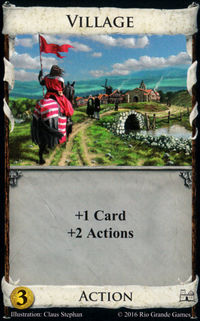
Village is the informal generic name for the family of cards which offer the ability to play more than one terminal Action in a turn—so called because many of them have "village" in their names. The simplest village card is Village itself. Typically, these cards offer +2 Actions, but there are some village cards which give this effect in other ways.
The presence of villages in a given Kingdom is important because having a cap on the number of terminal actions that can be played in a turn is a significant limiting factor in the potential of decks that can be built; Kingdoms with villages and Kingdoms without villages play very differently. Without the presence of villages in a Kingdom, the focus of most decks shifts to the non-terminals, plus the most desirable terminal available.
Every small Dominion expansion has at least two villages, and every other expansion has at least three.
Contents |
[edit] List of villages
Cards in italics have been removed.
[edit] Villages with no restrictions
These cards increase your terminal space by providing +Actions in a way that is relatively easy to take advantage of.
- Dominion: Festival, Village
- Intrigue: Mining Village, Nobles, Shanty Town
- Seaside: Bazaar, Fishing Village, Native Village
- Alchemy: University
- Prosperity: City, Worker's Village
- Cornucopia: Farming Village, Hamlet
- Hinterlands: Border Village, Inn
- Dark Ages: Bandit Camp, Fortress, Squire, Wandering Minstrel
- Guilds: Plaza
- Cornucopia & Guilds: Farmhands
- Adventures: Coin of the Realm, Lost City, Port
- Empires: Bustling Village, City Quarter, Encampment, Villa
- Nocturne: Blessed Village, Cursed Village, Ghost Town
- Renaissance: Hideout, Mountain Village
- Menagerie: Hostelry, Hunting Lodge, Village Green, Way of the Ox
- Allies: Capital City, Merchant Camp, Town
- Plunder: Harbor Village, Longship, Swamp Shacks, Wealthy Village
- Promo: Walled Village
[edit] Throne Room variants
The Throne Room variants Throne Room, Crown, Mastermind, Royal Carriage, Specialist, and King's Court allow you to play the same Action card multiple times on a turn. Although they behave a little differently than the standard villages above, they also increase your terminal space: using a Throne Room variant on a non-terminal Action, or on another Throne Room variant, will allow you to play two different terminal actions. These cards therefore usually enable the same types of decks that other villages do. For more detailed insight into this concept, see here.
Some Throne Room variants with more restricted behavior appear on the lists below.
[edit] Villages that need extra effort or support
These cards are villages that require you to jump through some hoops to get the effect. For some people it may be useful to think of these cards separately than the above list because you have to go through an explicit check to make sure it actually works on a given kingdom, other people don’t see it that way.
- With Tribute, you only get extra Actions if your opponent reveals an Action card from their deck; this is unreliable enough that the card was eventually removed from Intrigue.
- With Prince, there has to be an Action that can cost or less, or else the effect doesn’t work.
- With Diplomat, there needs to be a way to have 5 or fewer cards in hand after playing it, or else the effect doesn’t work.
- With Golem, there needs to be some other non-terminal on the board for the effect to work past the first play of Golem.
- With Trail, you only get extra Actions if you gain, trash, or discard this other than in Clean-up.
- For Herald and Ironmonger, you need to have enough Action cards in your deck to reveal an Action card often enough to get the effect a useful amount of times.
- Champion gives you unconditional unlimited Actions; but it takes a long time to get a Champion, so you're still going to have to plan to spend most of the midgame depending on other types of villages for your terminal space.
- With Lost Arts and Teacher you typically need a non-terminal Action to apply the +1 Action token, otherwise you are restricted to extra copies of only one type of terminal (the one you apply the token to).
- Conclave only gives a village effect if you can play an Action you do not have a copy of in play, so in practice, it only works if you have enough different Actions in your deck. Inspiring has a similar effect, plus it depends on playing the specific card with the Inspiring trait.
- First Mate and Patient, on the other hand, allow you to play multiple copies of the same card without using up Actions.
- With Royal Galley, there needs to be some non-terminal, non-Duration card on the board.
- Academy gives villagers whenever actions are gained and so usually requires a way to gain non-terminal actions, which is often achievable with +Buy or gainers, especially Horse gainers like Cavalry.
- Procession, Sacrifice, Recruiter, and Broker can require you to trash cards you might prefer to keep in order to get the village effect.
- Paddock only becomes a village when two supply piles are empty and so the game is likely nearly over.
- Toil, Scepter, and Market Towns allow you to play additional Actions, but only in your Buy phase. This puts some limits on what you can usefully play with them. Invasion specifically lets you play an Attack during your Buy phase.
- Landing Party doesn't return to your deck until you begin a turn by playing a Treasure, which usually means skipping your Action phase. Thus it lets you play extra Actions on one turn at the cost of forgoing playing Actions on a different turn.
- Taskmaster gives you an extra Action on your next turn only if you gain a card costing on this turn (but it will keep doing so for as many turns as you keep gaining s).
- Flagship is a Throne Room variant, but it itself is terminal; so using it doesn't actually increase your total amount of terminal space on the turn when you play it.
[edit] Villages offering limited terminal space
These cards are villages that are only available in very limited numbers, or have some other restriction that means you can only play one or very few extra terminals per turn.
When given a kingdom with only these villages, it can be useful to go through the line of reasoning for when there are no villages, but modify it with the limiting factor — “What can I do when I can only play 2 terminals per turn?” instead of just one per turn, for example.
- Tactician can usually only be played once per turn, and it really only moves your terminal space around, since it's terminal when you play it and only provides one extra Action next turn.
- Crossroads will only allow two additional terminal actions per turn.
- Necropolis, Trusty Steed, Dame Molly, Courser, and Demesne are villages you can (usually) only get one copy of, allowing you only one additional terminal action per turn.
- Barracks can only be bought once, and lets you play only one extra terminal per turn. Citadel and Piazza have the same issue in more complex ways.
- Madman works great when played, but it’s a one-shot, and in order to get more of them, you have to not buy any cards on a turn, which is often a very high cost.
- Sauna/Avanto, as a split pile, is difficult to get a lot of, so the number of terminals that can realistically be played is limited by that and the fact that sometimes it can be difficult to line them up properly and get maximum value.
- Disciple, Ghost, and Staff can be hard to get in multiples and there is a limited supply of them.
- Acting Troupe is a one-shot; it gives you a bunch of villagers that can be used for +Actions whenever you want, but once you've used them up, you're out of +Actions.
- Snowy Village gives you a lot of actions, but prevents you from getting any more Actions after that.
- Lich gives you +Actions, but at the steep price of making you lose a turn, so you really don't want to play it very often.
- Gondola allows you to play an extra Action card while gaining it, which in general can only happen a limited number of times.
- Launch is an Event that gives you +Action in exchange for , but may only be used once per turn.
[edit] Cards Gallery
[edit] Villages and Throne Room variants with no restrictions
[edit] Villages that need extra effort or support
[edit] Villages offering limited terminal space
[edit] Trivia
Donald X. Vaccarino has explained that the reason cards that give +2 Actions are often named after "villages" or other populated places (e.g., City, Hamlet) is because extra Actions are thematically represented by "a group of people doing things for you". Starting with Dark Ages, there have been villages without these thematic names.
Ruined Village is the only card with "village" in its name that does not provide +2 Actions; as a Ruins, it is notionally a village that has been stripped of most of its ability.
An inexperienced player who buys too many villages and not enough terminal Actions is informally referred to as a "village idiot".
